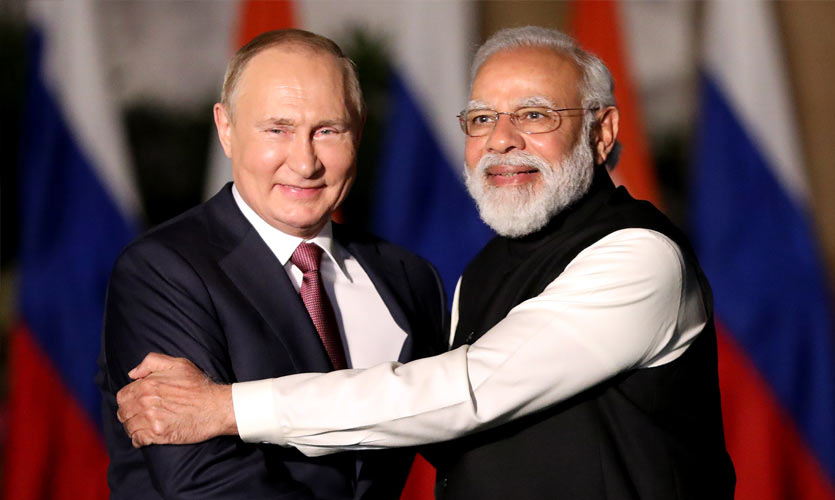Russian President Vladimir Putin arrived in India on Monday to meet with Prime Minister Narendra Modi and discuss key political, defence and business agendas to enhance the bilateral relationship between the two countries. Strengthening bilateral trade with Russia in the domains of defence, business, energy, culture and education, New Delhi and Moscow signed a record 28 MoUs.
Before the arrival of President Putin, a 2+2 format dialogue was held in the national capital between Defence Minister Rajnath Singh, External Affairs Minister Dr S. Jaishankar, and their Russian counterparts.
This is the first in-person meeting between President Putin and PM Modi since 2019, when they met on the side-lines of the BRICS summit in Brasilia.
The Russian president expressed his concern over the situation in Afghanistan, which is now facing a huge humanitarian crisis. With reports claiming that there is potential evidence of some hardliner Islamist terrorist groups flourishing in the region that could be a threat to other countries, President Putin flagged the “fight against terrorism, drug trafficking and organised crime” as key challenges on which both countries will have to cooperate. “It is natural we’re concerned about the development of the situation in Afghanistan,” he said in his opening remarks.
Highlighting the strong Indo-Russia relations since India’s independence and marking 50 years of the Indo-Soviet Treaty of Peace, Friendship and Cooperation, President Putin called India a “great power”, a “friendly” country and a “time-tested friend”.
“Despite the challenges posed by COVID, there is no change in the pace of growth of India-Russia relations. Our special & privileged strategic partnership continues to become stronger,” said PM Modi in his remarks.
“In the last few decades, the world witnessed many fundamental changes and different kinds of geopolitical equations emerged but the friendship of India and Russia remained constant,” said the PM, adding that the relation between India and Russia is “truly a unique and reliable model of inter-State friendship”.
The bilateral meeting manifests the strong Indo-Russia bond at a time when the regional geopolitics seems to be evolving with each passing day. Beijing appears to be the biggest threat to India, be it at the Line of Actual Control (LAC) in Northern Ladakh and Arunachal Pradesh, or in the Indo-Pacific. Islamabad continues to maintain its status-quo of hostility against New Delhi. However, Moscow enjoys a cordial relationship with Beijing given that both countries face economic sanctions imposed by the US and rest of the West, repeatedly. In a strategic move to counter China’s domination, India’s rapidly evolving diplomatic ties with the US are a welcome by-product. In this context, the Indo-Russia meet becomes more significant.
During a special briefing following the summit meeting between PM Modi and President Putin, Foreign Secretary Harsh Vardhan Shringla said that there was an “excellent discussion” between the two leaders that was “highly productive and highly substantive”. Besides the 28 MoUs, India and Russia also signed a programme of cooperation in the field of defence for the next 10 years from 2021 to 2031. While addressing the media, Shringla said, “The diversity of agreements and MoUs signed today shows the multifaceted nature of our bilateral partnership.”
The Ministry of External Affairs wrote in an official press release: “Bilateral talks between Prime Minister Modi and President Putin were held in a warm and friendly atmosphere. The two leaders expressed satisfaction at the sustained progress in the ‘Special and Privileged Strategic Partnership’ between both countries despite the challenges posed by the Covid pandemic. They welcomed the holding of the first meeting of the 2+2 Dialogue of Foreign and Defence Ministers and the meeting of the Inter-Governmental Commission on Military & Military-Technical Cooperation in New Delhi on 6 December 2021.”
Both Moscow and New Delhi put strong emphasis and discussed regional and global developments including the post-pandemic global economic recovery, and the situation in Afghanistan, the MEA informed. “They agreed that both countries share common perspectives and concerns on Afghanistan and appreciated the bilateral roadmap charted out at the NSA level for consultation and cooperation on Afghanistan,” stated the ministry. “We also cooperate in the military sphere like no other country, by that I mean we develop technologies… both countries have been holding joint military exercises on each other’s territories… We are concerned about terrorism, terror finance and organised crime,” said the Russian president about the developments in Afghanistan.
The leaders also discussed the role of connectivity through the International North-South Transport Corridor (INSTC) and the proposed Chennai-Vladivostok Eastern Maritime Corridor as per the MEA statement.
Rajnath Singh mentioned China’s evolving threat to New Delhi during the 2+2 meeting, and in this context, this bilateral meet is being viewed as a strong commitment of an old friendship.
India and Russia also inked an important agreement for joint production of over five lakh AK-203 assault rifles at a manufacturing facility in Uttar Pradesh’s Amethi besides firming up their pact on military cooperation for 10 years. The rifles will be manufactured for the Indian Armed Forces at a cost of around Rs 5,000 crores.










